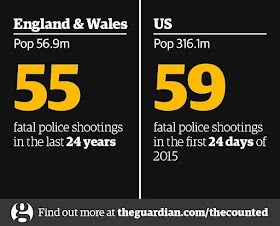In April, 4 Swedish policemen were on vacation while traveling on a subway to see Les Miserables. While on the train, the driver called for help to deal with two homeless men who were fighting near the drivers cabin. The Swedes went to assist by breaking up the fight and restraining the aggressor without the use of deadly force. Even when they are here, Swedish police are not packing heat and prefer to use restraint rather than force to calm things down.
In the UK, The Guardian has compiled an amazing set of data on police shootings called The Counted, In this study, The Counted compares the US to the rest of the industrialized world, giving us a picture in clear relief of American police with the rest of the world as a backdrop. The pictures are not pretty and here is one of them:
That is a staggering comparison, but the numbers don't lie. American police tend to be more than a bit trigger happy. If there needs to be better gun control, it needs to be exercised upon and by the police.
But there is more to the story here than just killings. This is a result of public policy that has been in place for decades. What is also interesting to note is that as birth rates decline and our population ages, we'd expect the crime rate to go down. And it has, as documented by FBI statistics. Yet the rate of police shootings has failed to decline with it. This means, in so many ways, that public policy is not working when it comes to the safety of Americans at the hands of police.
Who writes public policy? In nearly every study conducted on the subject of the responsiveness of American leadership to the people they serve, the answer is plain to see: The 1%. They are the people writing the policy. They are the people driving the policy. Everyone else? They are powerless to do anything but watch, if they want to work within the system.
Howard Zinn once noted that “Protest beyond the law is not a departure from democracy; it is absolutely essential to it.” If the courts, the legislature and the various administrations at state and federal levels are unresponsive to the needs of the people, then we can expect to see protests en masse. This is what we have seen in Ferguson, Missouri where voter turnout is so low, that the police are composed of a white majority in a town that is mostly black.
The horrendous number of police shootings in America is supported by public policy, not public opinion. To turn this around, we need to increase voter turnout, or the trend will continue and very likely get worse. It might be easy to blame the problem on the 1%, but we're fooling ourselves if we blame the 1% without getting out of the house to vote. In order for democracy to work for all of us, all of us must participate in government.
If we just vote, we decide who will cut the checks and write the laws. We must do more. Every legislature publishes their proceedings online. We can show up or follow their work. Every city council has meetings and we can show up or follow their work online, too. For Congress, there is C-SPAN and congress.gov.
Every agency writes regulations that implement the laws. We can participate in the rule making process to change how the laws are implemented. We participate by following the agencies and writing comments when new rules are proposed to implement the law. We participate in and/or follow administrative proceedings when we can.
In the courts, I learned long ago that if more than 1% were to fight their traffic tickets, the system would grind to a halt. We must be willing to follow the courts and fight in the courts if the need arises.
The numbers clearly show that the 1% is not capable of or willing to writing laws that benefit everyone. It's up to us to the rest of us to make the changes we want. We must be the change we want to see.

No comments:
Post a Comment